“The 7 Habits of Highly Effective People” by Stephen Covey is one of the most influential self-help and leadership books ever written. Since its publication over 30 years ago in 1989, millions of readers have implemented Covey's principles into their personal and professional lives, with fantastic results.
At the core of the book are seven habits that will improve your life and leadership. They help you improve your personal well-being, stress management, and achieving balance, while also giving you proven techniques and tactics to make you a better manager.
Yet, we all don’t have time to read 400+ pages and reflect on how you should apply them at work.
That’s why in today’s post, we will share the key takeaways and a detailed summary of the 7 habits of highly effective people. You'll learn what are the 7 habits, what they mean, and how you can apply them at your workplace.
The main Principles and Ideas from the 7 Habits of Highly Effective People
Whether you haven’t read the book yet, or need a refresher, it’s important to start with understanding what the 7 habits are. Here's a brief overview of the seven habits in order that we’ll be diving into today:
- Be Proactive: Focus on things you can actually do something about. Proactivity is about taking responsibility for your life.
- Begin with the End in Mind: Define clear, long-term goals to ensure that the steps you're taking are in the right direction, starting with where you want to end up.
- Put First Things First: Prioritize tasks based on importance rather than urgency to manage your time and life effectively.
- Think Win-Win: Seek mutually beneficial solutions or agreements in your relationships. Value and respect people by understanding a "win" for all is ultimately better.
- Seek First to Understand, Then to Be Understood: Use empathetic listening to genuinely understand others. Use this to keep an open mind and better collaborate.
- Synergize: Combine the strengths of your team through positive teamwork, to achieve goals no one could have done alone.
- Sharpen the Saw: Balance and renew your resources, energy, and health to create a sustainable, long-term, sustainable lifestyle.
Let’s start reviewing the 7 Habits of Highly Effective People sparknotes to get the core ideas and summaries of each habit.
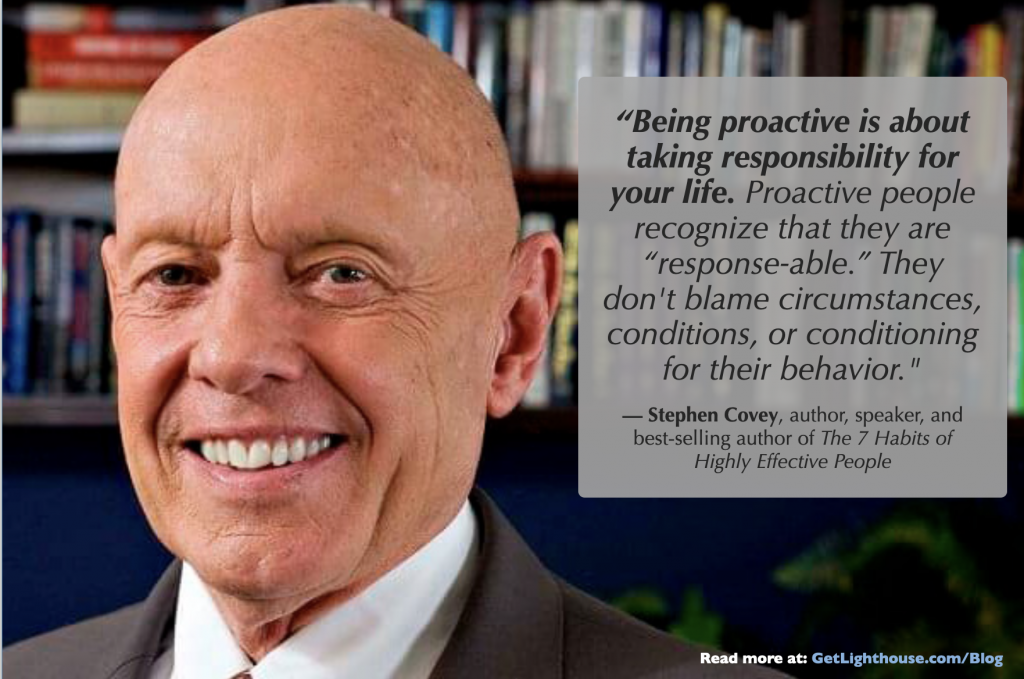
Habit №1 - Be Proactive
Diving into the first habit sets the stage for everything that follows. Being proactive is essentially about understanding that the decisions you make shape your life. This means it's crucial to act rather than just react to what life throws at you.
At its heart, proactivity is about believing in your power to choose how you respond to challenges and new situations. It pushes you to act based on your values and principles, rather than act impulsively.
A key part of this idea is understanding your Circle of Influence and your Circle of Concern, which are defined as follows:
- Circle of Influence: This is about the parts of your life you can directly change or influence.
- Circle of Concern: This covers the wider issues you care about but can't directly control.
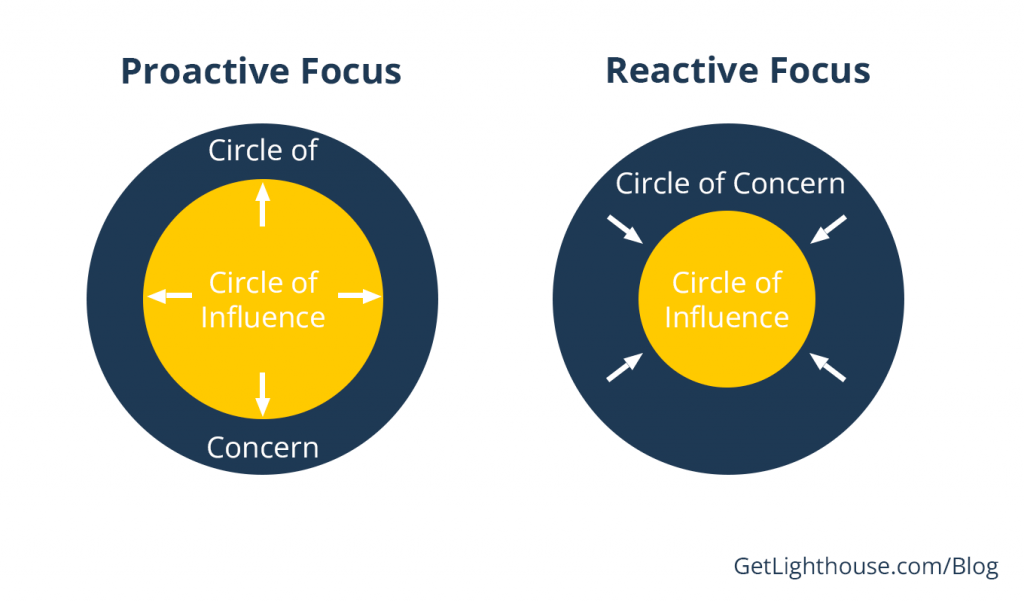
Shifting your focus and energy to where you can actually make a difference (your Circle of Influence) not only makes you more grounded, but also expands your ability to effect change. If you put more effort and energy into what you can actually control, you’ll get better results than fretting over things you can’t (the Circle of Concern).
What Managers can Learn from This
As a manager, adopting a proactive approach means owning up to your decisions and their ripple effects, rather than pointing fingers at outside circumstances or blaming others.
- Take charge: Acknowledge your responsibility to lead your team and be accountable for the results of everyone’s efforts.
- Lead by example: How you act sets the standard. Showing proactivity encourages your team to do the same, while if you’re accountable, your team will be more likely to embrace self-responsibility as well.
- Zone in on what you can control: Pay attention to what's in your hands — be it your approach to management, how you delegate, or your way of communicating. Focus here, while not letting things beyond your control bother you too much.
- Create an open Dialogue: Keeping the lines of communication wide open with your team helps you stay ahead of the curve, adjusting as needed and empowering your team to be proactive in their roles, too. If kick-starting this conversation seems daunting, take a look at our guide on gathering more feedback from your team.
Applying a proactive mindset not only helps to strengthen your role as a leader, but also helps your team build similar habits. This creates a self-reinforcing loop that allows you and your team to get better and better over time.
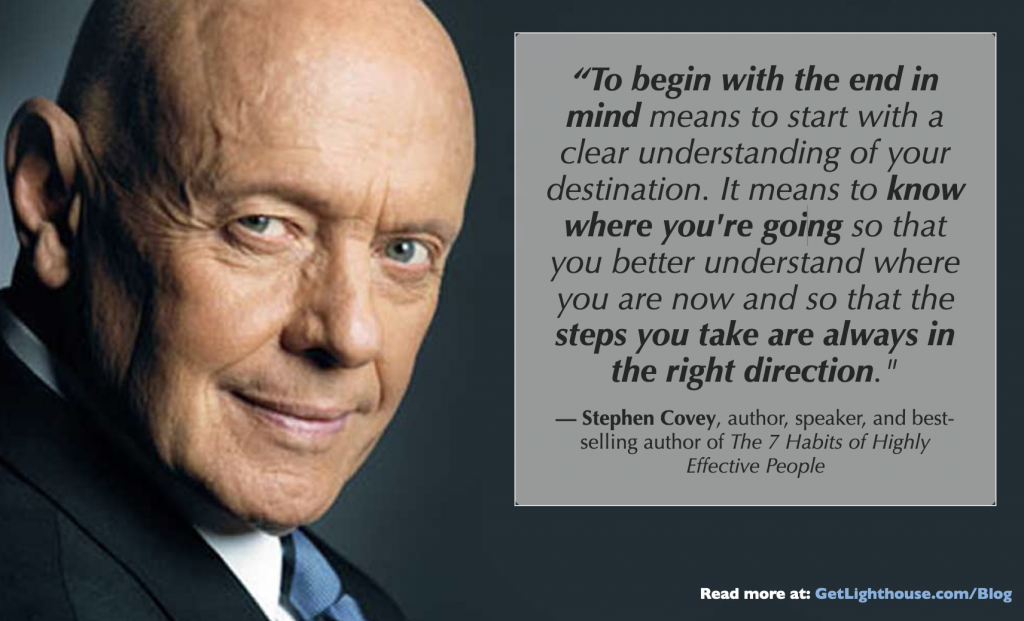
Habit №2 - Begin with the End in Mind
The second habit, “Begin with the End in Mind,” is all about having a clear vision and a plan for getting there. Stephen Covey really hammers home how crucial it is to know where you want to end up before you start moving.
This habit is your reminder to pause and think about what you're aiming for before you dive into action. It's like setting up your personal and professional GPS. Crafting a mission statement is a big part of this. Think of it as your personal slogan — it spells out your core values and what you stand for, guiding your choices and actions.
By starting with the end in mind, you make sure you get to where you want to go, rather than letting life tumble you in a direction you didn’t intend. It builds on being proactive, by now giving you a firm direction where your proactivity should direct you.
What Managers Can Learn from This
Learning this habit can transform your approach to leadership and how your team operates. Here's how:
- Build a Clear Vision: Take the time to define and share a vision that paints a picture of what you and your team are working towards. Make it something that sparks excitement and matches up with what's important to everyone on your team. By giving everyone a common goal, you can better motivate your team and get everyone driving in the same direction.
- Explain the "Why": Help your team see how what they do every day contributes to something bigger. When people understand how their work fits into the larger picture, it boosts their motivation and commitment because they know their work matters.
- Use SMART Goals: Spell out your goals in a way that's clear and trackable. SMART goals — specific, measurable, achievable, relevant, and time-bound — make it easier for everyone to know what you're aiming for and gauge how you're doing along the way.
- Assess with Clear Objectives: When it's time to look at how everyone's performing, use those goals you've set as your measuring stick. This makes sure you're all on the same page about what success looks like, and it helps keep everyone motivated to hit those targets.
- Schedule Regular Check-Ins: Make a habit of catching up one-on-one to see how things are going. These moments are perfect for giving feedback, making adjustments, and acknowledging the progress everyone's making towards your big-picture goals.
By weaving Begin with the End in Mind into your role as a leader, you lay down a clear path for your team. It removes ambiguity and uncertainty, while aligning your team to all work in the same direction. This makes you and your team much more likely to reach your goals than when everyone is heading in different directions or doesn’t know where you’re going.
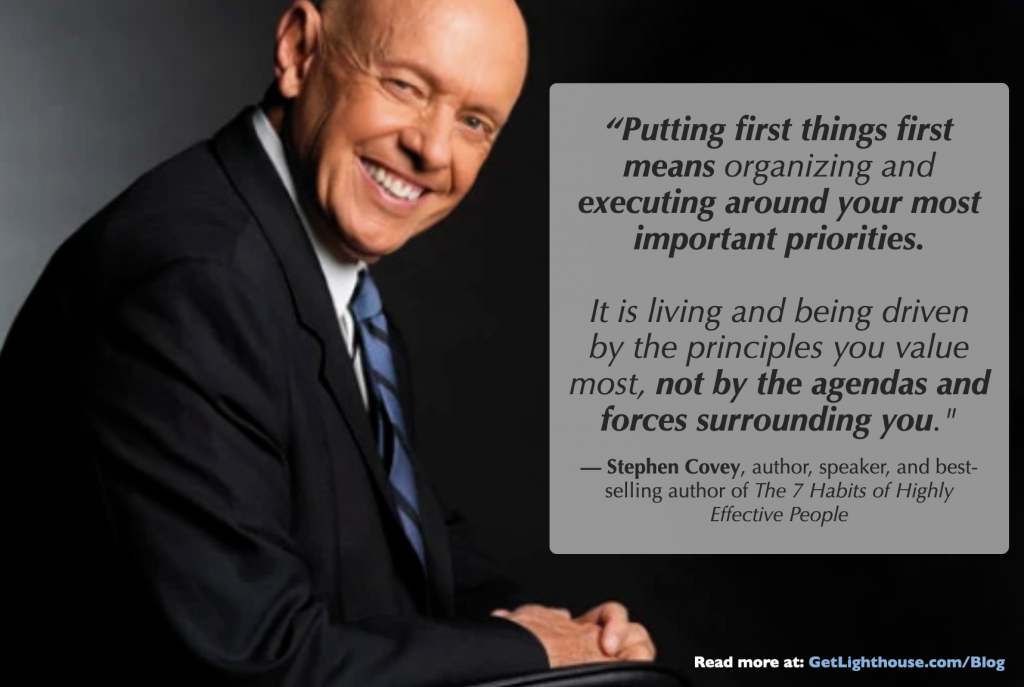
Habit №3 - Put First Things First
Habit 3 is all about mastering your time by prioritizing what truly matters. It's a game changer for any manager looking to lead a team that's not just busy, but productive and fulfilled.
This means zeroing in on the most important tasks and letting the rest wait, rather than getting sidetracked by every "urgent" thing that pops up.
At the core of this habit is distinguishing between what's urgent and what's actually important. The time management matrix lays it out clearly:
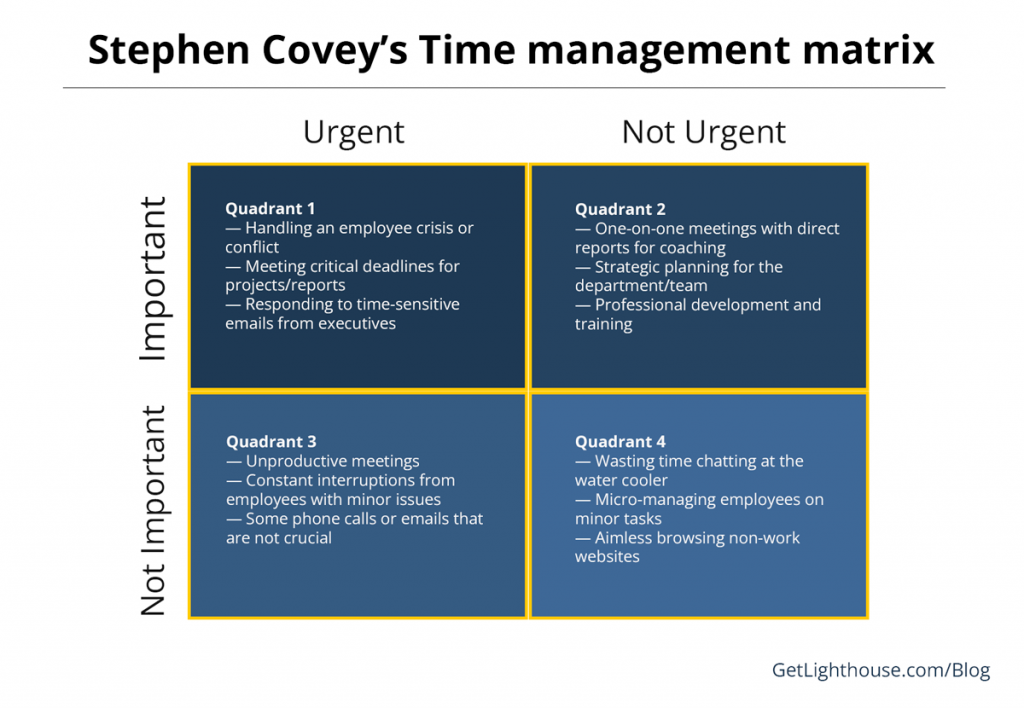
- Quadrant I: Urgent and Important (like key deadlines and crises)
- Quadrant II: Not Urgent but Important (think planning and building relationships)
- Quadrant III: Urgent but Not Important (certain calls or emails)
- Quadrant IV: Not Urgent and Not Important (distractions and time wasters)
The magic happens when you focus on Quadrant II activities. These are the ones that really propel you and your team forward toward your long-term goals.
What Managers Can Learn from This
For managers, Habit №3 offers invaluable lessons in leadership and team management:
- Carve out time for what's important: Make sure to set aside specific times to tackle big projects without interruptions. This dedicated focus time is critical to make sure you consistently make progress despite other things competing for your attention.
- Learn to delegate: Hand off less critical tasks (Quadrants III and IV) to others as much as you can. This not only frees you up to focus on more critical things, but can provide opportunities for your team members to develop new skills.
- Boost your team's impact: Keep an eye out for opportunities where a little coaching or skill development can go a long way. Investing in your team's growth motivates them, and is a high leverage, high impact, Quadrant II activity for you.
- Focus on Priorities, not just the Clock: Remember, it's not about how many hours you work; it's about making your hours count. By prioritizing wisely, you'll lead by example, showing your team that it's the outcomes that matter, not just the time clocked in.
Habit 3 is about investing your time doing the right things.
This builds on the prior two habits by managing your time well as you proactively move towards your desired end goals. It’s just as important to manage your time each day as it is to set goals, which is why this is also one of the 7 habits.
Further reading:To get more insights about priority management, check our post about — Why Priority Management Trumps Time Management (+8 Ways To Practice It).
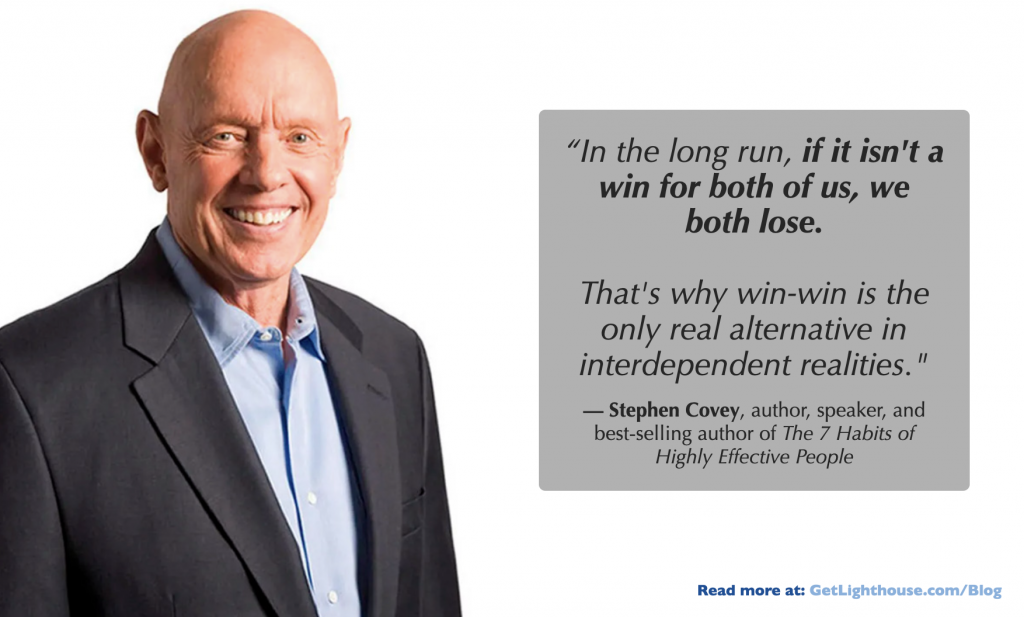
Habit №4 - Think Win-Win
The "Think Win-Win" mindset teaches us that your success does not require another person's failure or loss. Instead, you should seek out mutually beneficial solutions in negotiations and interactions. This allows you to play long term games with the people you interact with.
Win-win thinking will transform your leadership style and team culture.
Rather than viewing employees as adversaries or resources to exploit, in a win-win mindset, you see them as partners sharing aligned interests. Practically, this means taking time to understand their motivations and goals, and matching them with your team and company goals.
It also means approaching discussions by looking for solutions that satisfy all sides as much as possible. Be open to creative compromises that accommodate different needs and perspectives, whether negotiating with clients, partners, or other teams.
What Managers Can Learn from This
Win-win thinking will transform your leadership style and team culture, making it more collaborative, open, and energized. Here is how you can do it:
- Dig Into What Drives Your Team: Spend real time getting to know the people you work with. What are they passionate about? What goals do they have? Understanding these aspects helps you match your team objectives with their interests and passions.
- Aim for Mutual Benefits: Whenever you're at the negotiating table or making decisions, strive for solutions that everyone can get behind. This helps foster a collaborative spirit and also avoids harmful competition or outright resistance from others.
- Flexibility Leads to Harmony: Finding that win-win often means getting creative. Being flexible enough to adjust your views to accommodate others' needs and learning their perspectives can pave the way for outcomes that everyone is happy with.
By applying a win-win mindset to your management style, you signal to your team that their aspirations and concerns matter. You create an environment where great ideas can come from anywhere, and everyone feels heard.
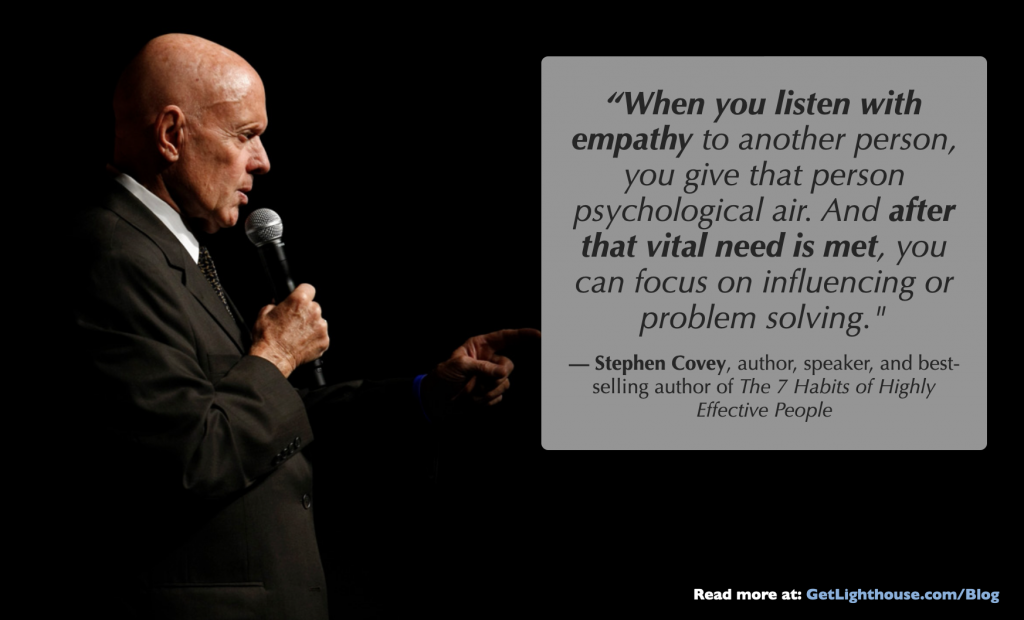
Habit №5 - Seek First to Understand, Then to Be Understood
The 5th habit urges you to listen first to truly get what the other person is saying, before worrying about feeling heard yourself.
It points out a big gap in how we're typically taught to communicate. Think about it: you've learned how to read, write, and talk, but what about listening? Chances are, you didn’t have many classes on that in school.
When you listen to understand the other person, you're tuning into not just their words, but also the feelings and body language of the speaker. This is different from how most people listen, which is usually focused on thinking about how you’re going to respond while you wait for your turn to speak. The latter approach leads to many missed opportunities, which the former approach creates.
What Managers Can Learn from This
For managers, the ability to listen empathetically is crucial for being an effective leader. How you use the approach can transform you, your team, and the results you achieve.
To apply this habit, you will:
- Truly listen to others: Make sure your team feels heard. Take the time to really listen to what they have to say by asking clarifying questions, and pausing before worrying about how you’re going to respond.
- Resolve issues faster: When you take the time to listen and understand others, you will often find problems become more clear and easier to resolve. Empathetic listening often reveals context you may not have known initially, which then leads to better solutions.
- Have more Buy in and Teamwork: When people feel listened to they are then more ready to listen to you, too. This makes it easier to then make asks of them, and understand what it takes to get their support for changes.
Adopting this habit not only improves your relationships within your team, but also creates an environment of respect and understanding. This can make a big difference in how happy and successful your team is, while also giving you a toolset that is useful in every aspect of your life; everyone likes feeling heard whether in your personal or professional life.
Further reading:
- For additional insights into how asking the right questions can significantly improve your ability to understand your team members and lead more effectively, check our post about "Two Key Words To Remember That Will Help You Be A Great Manager".
- And another one, if you want to learn the power of active listening — "How Managers Can Be More Effective Listeners".
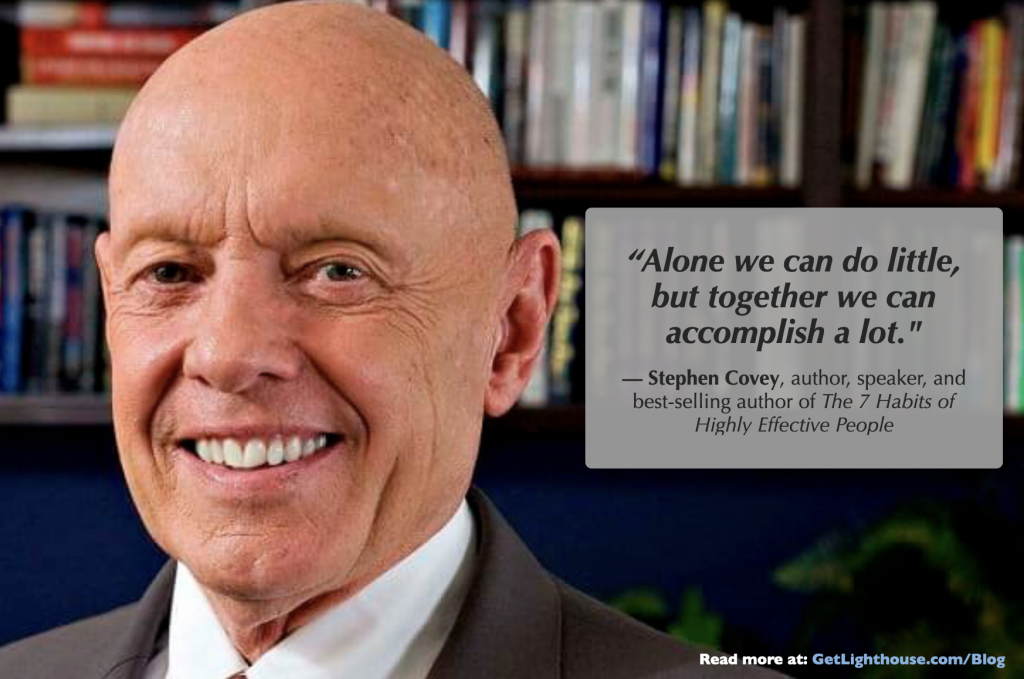
Habit №6 - Synergize
Covey in Habit #6 — Synergize — writes about the idea that you should be working together, not alone.
Imagine mixing different ingredients to create a new, amazing flavor. That's what happens when you combine your skills and ideas with others. You end up creating solutions and ideas that you'd never come up with by yourself.
This habit shows the strength in our differences, turning what might seem like obstacles into opportunities for growth and creativity.
Synergy is like discovering a secret path together that you couldn't find on your own. It’s about seeing the value in how different we all are, and realizing that these differences make the team stronger and the work more interesting.
What Managers Can Learn from This
For managers, developing synergy within your team involves several key practices:
- Value Everyone's Input: Understand that the people you work with have their own unique insights, which you should actively seek out. When you mix those with yours, you can come up with something really special.
- Focus on Strengths: As highlighted by Gallup, individuals who use their strengths every day are 6 times more engaged and productive. Recognize the unique strengths of each of your team members, and use this knowledge to assign tasks proactively to leverage them.
- Bring Your Team Together for Brainstorming: Brainstorming is an excellent way to draw on the diverse perspectives and cognitive diversity within your team. To maximize these sessions, work to create psychological safety so everyone is comfortable sharing their ideas, no matter how bold, unusual, or risky.
- Embrace Cognitive Diversity: Teams with a mix of thinking styles and perspectives tackle new challenges more successfully. Seeking out this kind of cognitive diversity doesn't just help dodge groupthink; it also helps your team handle complex issues more effectively.
Adopting a synergistic approach is about creating a space where everyone's differences are celebrated and used to create better ideas. It's not about agreeing all the time but about using these varied perspectives to achieve great things together.
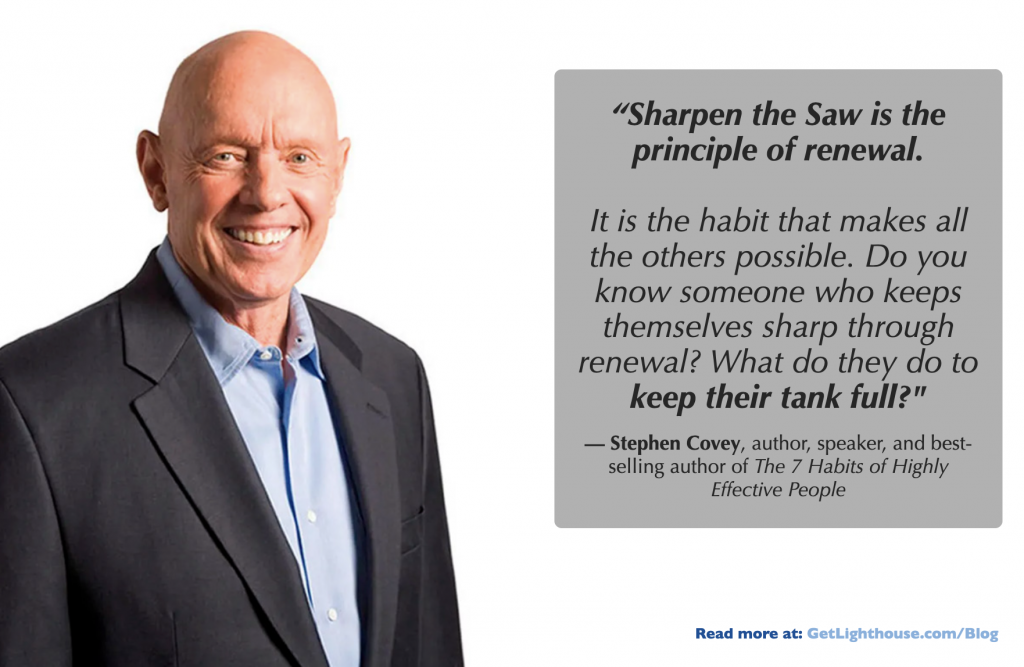
Habit 7 - Sharpen the Saw
Habit #7 is your reminder to take care of yourself. Think of it as keeping your personal toolkit ready and sharp. It's all about maintaining and improving yourself in four main areas:
- Physical
- Mental
- Social/emotional
- Spiritual.
To "sharpen the saw" means to take proactive steps towards preserving and improving your own capabilities. It helps you face life's ups and downs with more energy and a clear head.
If you skip this, you might end up feeling worn out, lacking energy, and unmotivated to continue to practice the other habits. Fortunately, when you make time for yourself and ensure you recharge, you can start each day ready to go, full of energy, and with a positive outlook.
What Managers Can Learn from This
Sharpening your saw is an important part of being an effective leader. Here’s how to put it into practice to you, and your team’s, benefit.
- Model Work-Life Balance and Avoid Burnout: Your example is critical for showing your team how to manage their energy and workloads. Demonstrating that you value your own well-being encourages them to do the same. As a manager, it’s valuable for you to take a break sometimes to avoid burnout and recharge.
- Pursue Personal Growth and Learning Opportunities: Whether it's picking up new skills, reading, or exploring new experiences, building new skills is as important for you as it is for your team. In our "8 Best Development Goals For Managers" you can find a roadmap for your growth as a leader.
- Take Time to "Recharge": Stepping away from work to enjoy hobbies and activities you enjoy is key to staying mentally and emotionally fit. These breaks refresh you and can spark creativity and new ideas by creating space in your work.
- Invest in Your Team's Growth: Just as you invest in your own development, putting effort into your team's growth is key to sharpening their saws, too. Support their learning paths and career goals just like you invest in your own. This not only helps them advance, but also builds a more capable, and motivated team.
By sharpening your saw as part of your leadership style, you're not just looking after yourself; you're also creating a healthier, more sustainable team environment. It shows that taking time for self-renewal isn't something to be avoided — it's a necessity for your long-term success and well-being, both individually and as a team.
Further reading:
For more insights on employee development, check the following blog posts:
- Employee Development: How To Grow Your Employees When You Can't Promote Them
- Employee Development Plans: The Competitive Edge To Winning The World Series And Helping Your Team Thrive
Summary of the 7 Habits of Highly Effective People
So you have learned what are the 7 habits and what do they mean. Understanding these seven timeless habits serves as a powerful call to action for you to look inward; by applying them, it gives you a chance to assess and refine not only how you lead others, but how you lead yourself.
It's also a reminder that the path to becoming a highly effective manager is ongoing, demanding continuous reflection, learning, and adaptation. That’s why we shared not only the habits, but how you can apply them every day. It is through putting them into practice that you’ll see the results and impacts we discussed.
If you want to learn more about Stephen Covey’s ideas, then check out our post about his amazing concept — the emotional bank account, and you can pick up a copy of his book here.
And if you enjoy developing your skills and getting actionable advice to grow as a leader, our training courses can help you develop the most important management skills. You can learn more and sign up to level up you and your company’s leaders here.





